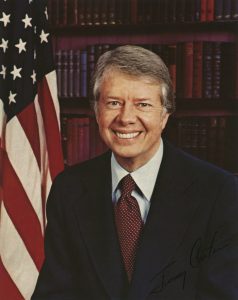
Former President Jimmy Carter, a champion of church-state separation, died Dec. 29 at age 100.
Carter was a devout Baptist and a strong advocate of separation of church and state. He opposed vouchers for private religious schools, rejected mandated prayer in public schools and supported abortion rights.
A good summary of Carter’s views is found in an October 1976 letter he wrote to the president of the American Humanist Association: “An important tenet of the Baptist faith is complete separation of church and state. I hold this view. And I have not found it to impose a strain either on my personal religious convictions or on my performance in public office … . I’ve never used political office to force my religious convictions on someone else.”
Carter added, “I would be a strong defender of the First Amendment and interpret it very strictly.”
As president, Carter put that philosophy into action. When U.S. Sen. Daniel Patrick Moynihan (D-N.Y.) proposed a nationwide program of grants to pay for private school tuition, Carter opposed it.
On April 6, 1979, a reporter asked Carter about prayer in public schools during a press conference. The reporter noted that U.S. Sen. Jesse Helms (R-N.C.) had added an amendment to an education bill that called for “voluntary” prayer in public schools. The reporter wanted to know if Carter thought this was unconstitutional. Carter’s response was succinct and memorable: “I think the government ought to stay out of the prayer business.”
In 2012, Carter was the first current or former president to voice support for marriage of same-sex couples.
“We at Americans United mourn the loss of President Jimmy Carter, a human rights advocate who championed the separation of church and state because of his deep religious faith,” said AU President & CEO Rachel Laser, in a statement. “We thank President Carter for his service to our country and for including church-state separation and religious freedom among the important issues he championed. We extend our heartfelt condolences to his friends and family.
“A devout Baptist and Sunday school teacher, Carter often referenced Baptists’ traditional esteem for church-state separation as the shield that protects religious freedom for everyone,” Laser added. “Carter opposed religious leaders and houses of worship politicking, taxpayer funding of religious organizations (especially those that discriminate), removing evolution from school science classes, and coercing students to pray in public schools.”
She concluded, “Carter recognized his responsibility to divorce his personal religious views on abortion from presidential policies and his administration made strides on LGBTQ+ rights.”
Carter publicly ended his lifelong membership in the Southern Baptist Convention in 2000 in large part because of the denomination’s union with conservative politics. He explained the dangers of this union in 2003: ‘When a group of Christians [tries] to implant through government our beliefs on others as superior, that subverts the basic constitutional prohibition concerning separation of church and state. And when we try to use the federal government to intercede in religious affairs, it inherently weakens the unique character of Christ’s kingdom.”